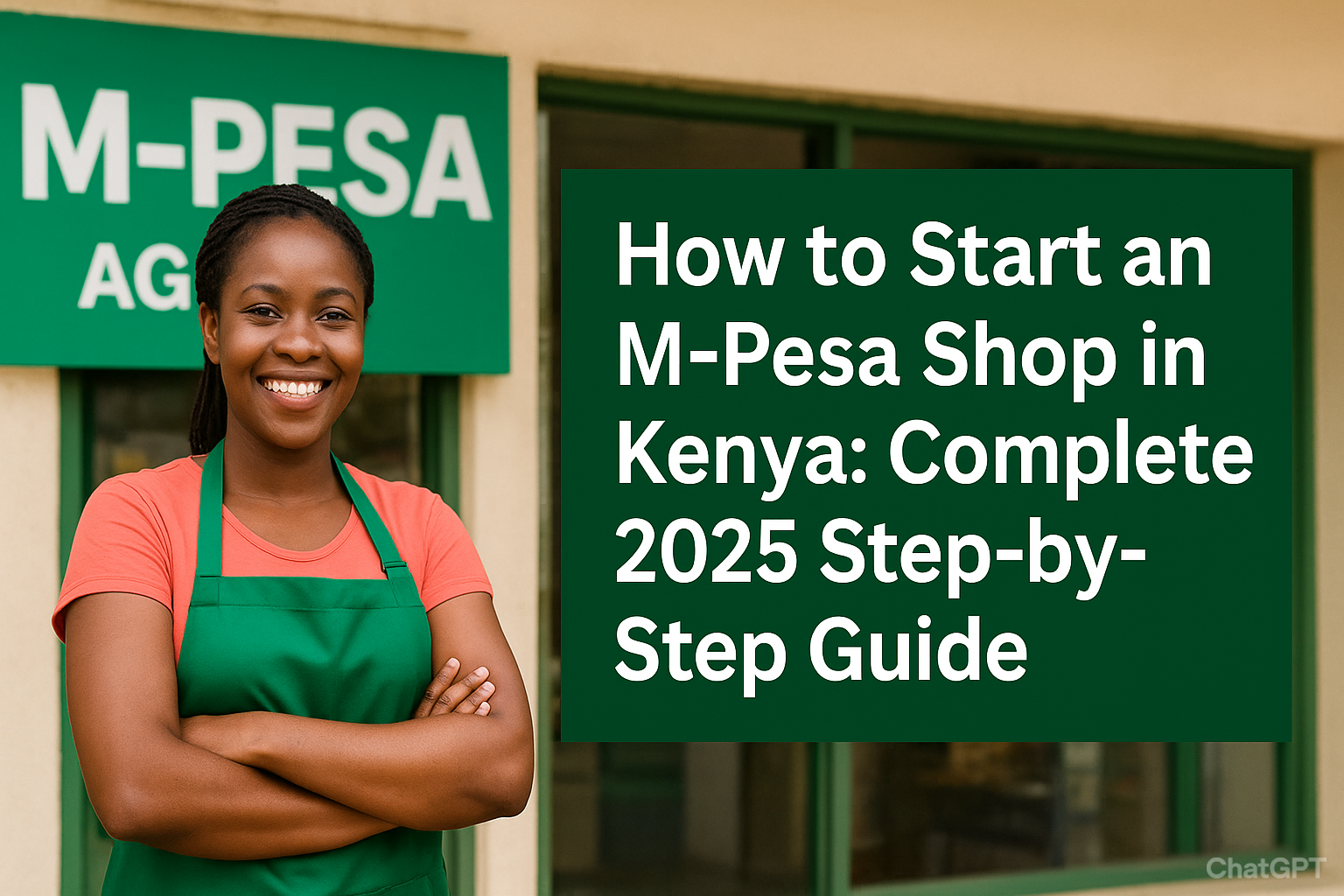

Titus Morebu
Author
How to Start an M-Pesa Shop in Kenya: Complete 2025 Step-by-Step Guide
Learn step-by-step how to become a Safaricom M-Pesa agent shop in Kenya in 2025 — requirements, investment, documents, profits & tips to succeed.
Why Start an M-Pesa Shop? 💡
M-Pesa remains one of the most widely used mobile financial services in Kenya, offering money transfers, deposits, withdrawals and other services. Setting up an agent shop gives you a steady income stream from transaction commissions, while serving your local community and building trust. With the demand growing, especially in underserved areas, the opportunity remains strong.
Overview: What it Means to Be an M-Pesa Agent / Shop
- Operate as an Authorized Agent under Safaricom (or under a Super Agent).
- Handle customer transactions including deposits (cash-in), withdrawals (cash-out), new registrations, and possibly PayBill / Lipa Na M-Pesa services.
- Maintain a float (cash & e-money liquidity) so customers can transact without delays.
- Comply with regulatory, branding, and technological requirements for reliability and integrity.
Step-by-Step Guide to Starting Your M-Pesa Shop
Step 1: Business Structure & Legal Registration
- Register as a legal entity. Usually a limited company or equivalent.
- Ensure your business has been operating for at least **6 months** under that registration. This shows stability. (Safaricom requirement)
- Obtain or renew required licenses, including business permit from your local county, tax compliance certificate etc.
- Register or confirm Kenya Revenue Authority (KRA) PIN, and ensure all company documents (CR12 or equivalent for companies) are up to date. CR12 is a document showing current shareholders / directors.
Step 2: Identify Outlets & Location
- You will need **at least three outlets** ready to offer M-Pesa under the company name to qualify as a standard agent. These outlets must be audited before operations begin.
- Select locations with high foot traffic: near markets, busy roads, transport hubs, commercial centres.
- Ensure the premises meet Safaricom branding and signage requirements — visibility, signage, signage type, safety etc.
Step 3: Prepare Required Documents & Verification
- Certificate of Incorporation (or equivalent in other business types).
- Form CR12 (valid within the last 90 days) for directors or owners.
- Valid national IDs or passports, with passport photos for the owners / directors.
- Business permit from the local county.
- Tax compliance certificate, KRA PIN documentation.
- Other due diligence (KYC / AML) paperwork as required.
Step 4: Financial Requirements & Float Investment
- Each outlet must have an initial float (cash & electronic money) — Safaricom requires around **KES 100,000 per outlet**. This ensures you can cover withdrawals and cash-ins.
- There may also be fees or deposits for SIM replacement (SIMEX) or other technical components.
- If running multiple outlets, ensure you have sufficient capital to maintain float in each. Late deposits or failing to maintain float may lead to contract revocation.
Step 5: Technical & Equipment Setup
- Head office / central coordination: computer(s), printer, internet, email contact and telephone line. These help with reporting, accounting, managing multiple outlets.
- Ensure you have approved point-of‐sale or till systems where required (e.g. for Lipa Na M-Pesa services).
- Ensure staff with minimum qualifications (often at least KCSE or equivalent) and integrity. Staff will be handling cash and sensitive customer data.
Step 6: Apply & Get Contracted
- Submit your application to a Super Agent or directly to Safaricom, with all required documents and proposed outlets audited and approved.
- Super Agents are companies contracted by Safaricom who onboard and support multiple agents. If you work under a Super Agent, their terms may add to what Safaricom mandates.
- Once approved, you receive your till / agent identifiers, line SIMs, signage / branding guidelines.
Step 7: Launch Operations
- Set up your outlets: signage, safe secure cash storage, float management tools, record-keeping.
- Train staff in customer service, fraud prevention, KYC procedures, and how to use the technology (SIM, phones, till, reports).
- Begin offering services: new customer registrations, deposits, withdrawals, bill payments etc.
- Monitor transactions closely, maintain liquidity, watch for issues like float shortages, overdrawn till etc.
Key Safaricom-Specific & 2025 Updates
As of mid-2025, Safaricom has clarified some updated requirements and distinctions:
- To qualify as a **Super Agent**, you must meet standard agent requirements, plus maintain a minimum float balance of **KES 200,000 in the head office**, and be ready to deploy at least three outlets.
- Exceptional / special categories (banks, supermarkets, hospitals, petrol stations) or remote locations may have relaxed outlet number requirements — sometimes as low as one outlet — but with higher float / capital.
- Some financial institutions now offer “float financing” to agent shops, allowing agents to borrow against commissions or residual income to maintain liquidity. (Useful for agents in high-growth or high traffic areas.)
Profitability: What to Expect & How to Maximize
- Commission margins: Agents earn commission per transaction — deposits, withdrawals, new registrations etc. The more transactions you handle, the more you earn. Margins per transaction are small, so high volume is crucial.
- Location matters: Busy roads, transport hubs, dense residential or commercial areas increase transaction volume.
- Reliability & availability: Always maintain float, avoid downtime — if customers come and you cannot serve them, you’ll lose trust and business.
- Trust & customer education: Many users are new to mobile money services. Helping customers understand charges, safety (PIN, receipts), etc., builds loyalty and word-of-mouth growth.
- Diversify services: Agents often also offer Lipa Na M-Pesa, PayBill, buy goods, minor banking agency services. These widen income streams.
- Cost control: Minimize losses (fraud, theft, float mismanagement), control overheads (transport, rent, utilities), keep good records for taxes, etc.
Challenges & Ways to Overcome Them
- Float shortages: Plan your cash flow; consider partnering with super-agents or banks that offer float financing.
- Security risks: Secure premises, minimal staff handling cash, install CCTV where feasible, maintain logs of transactions.
- Fraud / misuse: Follow KYC/AML rules strictly; train staff; verify customer identities; keep good records.
- Regulatory changes: Stay updated with Safaricom policies, Central Bank of Kenya regulations, tax laws etc.
- Competition: Be courteous, fast, reliable. Good location and service help you stand out.
Useful Resources & External Reading 📚
Checklist: Before You Start
- ✔ Registered company, valid documents (CR12, IDs, business permit).
- ✔ Minimum 3 outlets (unless special category/remote), each with staffing, signage, safety.
- ✔ Float of ~KES 100,000 per outlet (or higher for special / super agents).
- ✔ Technical setup: computer, internet, communication lines, printer, email etc.
- ✔ Qualified & trained staff.
- ✔ Branding & signage arranged.
- ✔ Contract signed with Safaricom or via Super Agent, till lines / SIMs in place.
Conclusion
Starting an M-Pesa shop is a viable and often profitable small business in Kenya. It requires a mix of legal readiness, sufficient capital (especially float), technical set-up, and a good location. With rising demand for mobile money and payments, those who do it well—maintaining float, delivering great service, and staying compliant—can build a sustainable business. If you're ready, begin with the registration and documentation steps, set up your outlets smartly, and keep your operations solid.
Gallery

Related Articles
3 articles
Electrical & Internet Installation Business in Kenya: How to Launch & Succeed 💡
Build a profitable electrical + internet installation business in Kenya: from market analysis, service mix, licensing, operations, marketing, to scaling for sustainable growth.

How to Sell Fresh Juice & Snacks in Residential Estates – Ultimate Guide
Discover how to launch and grow a thriving fresh-juice and snack business in estates: location, menu, pricing, marketing & logistics all covered.

How to Earn Money with Affiliate Marketing in Kenya: Your 2025-Ready Roadmap 💡
Learn how to make money through affiliate marketing in Kenya by choosing the right niche, joining solid programs, driving traffic, and getting paid—all step by step.